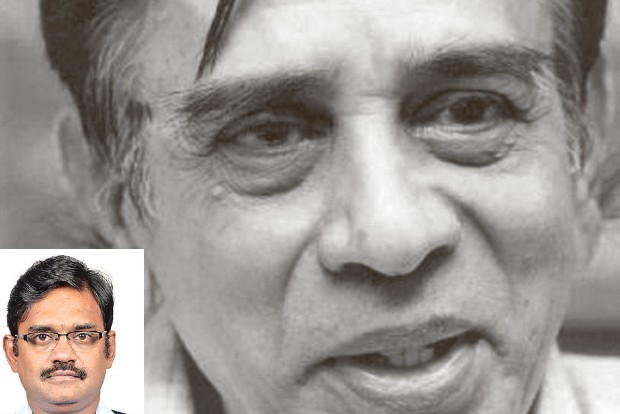Begin typing your search...
Those were the days: Sujatha, a celebrated writer who foresaw WFH scenario decades ago
In this series, we take a trip down memory lane, back to the Madras of the 1900s, as we unravel tales and secrets of the city through its most iconic personalities and episodes.

Chennai
Many modern writers in Tamil chose their pet genres. No one except Rangarajan would dabble in so many of them. Penning with his wife’s name, Sujatha (to circumvent a mix-up with the name of an already recognised author Ra.ki. Rangarajan), Sujatha’s Tamil literary career spanned more than four decades and over many categories of writing. He was perfectly at home describing the Agraharam bylanes of pilgrim town Srirangam where he grew up, to writing scenes about bloody murder plots and their investigations as well as science fiction scenarios of the 24th century. He could write on all topics and surprisingly almost simultaneously in different magazines effortlessly. But he was more loved for the way he wielded his pen to create often saucy (and sometimes considered male chauvinist) wordings.
Born in Triplicane, Madras, he grew up on the shores of the Kaveri in his grandparent’s house for his father had a transferable job. Srirangam was traditionally known for its scenic beauty as well as culture and literature. A keen observer of lifestyles there, we find Srirangam as the storyscape in many of his productions.
An earnest student in academics as well, Rangarajan studied Electronics from the reputed Madras Institute of Technology, where he was a batchmate of statesman APJ Abdul Kalam.
Never aiming to be a full-time writer, he was employed in a public sector company but was still prolific in his writing. Starting with a short story in 1962, he wrote almost a hundred novels, three hundred short stories, and a dozen books on science, plays, and poems. Other than this, he was a columnist in many magazines. Sujatha was so successful that it was often said that even his ‘laundry bills’ would get published in magazines.
Not one to miss a challenge to create some drama, Sujatha explained that ‘may be’ his laundry lists were interesting. The next week, a Tamil weekly actually published the ‘laundry list’ of crime writer Sujatha. Last on the list was ‘1 handkerchief — blood stained’.
Having tried all sorts of genres, he decided on a historical novel tempted by the huge readerships. It was set during the sepoy mutiny and was based on a community from South India. There were some controversy and copies of Kumudham magazine in which ‘Karuppu, sivappu, veluppu’ (black, red, white) were published were burnt on the streets of Luz. Kumudham immediately stopped the serialisation. Sujatha would do this novel later under a different name sans the controversies. But during the first hassle, he was afraid for his family and sent them away to their in-law’s place.
Certainly, not the first writer to dabble in movies, Sujatha was involved in cinema too. His novels when converted to celluloid had mixed receptions. Some sank without a demur and others like Gayathri and Priya were hits. But later as a scriptwriter in mega-budget or high-profile director-oriented (Shankar and Mani Ratnam) movies, he was very successful. Sujatha was also a co-producer for a movie banner that produced the acclaimed biopic Bharathi. He also immortalised Ganesh-Vasanth — an imaginary advocate pair serving as the main characters in most of his detective stories (Rajinikanth played Ganesh in one of the movies).
Sujatha was very inventive in his engineering career as well. He was involved in the design and production of the electronic voting machine (EVM) during his career at Bharat Electronics Ltd (BEL). The EVMs were first used in 1989 in 16 Assembly seats in Madhya Pradesh on an experimental basis. Now approximately two million EVMs are used in general elections. Sujatha enjoyed immense gratification in its home-grown design. Later when doubts were raised over the exactitude and surety of the machine, Sujatha wrote several informative articles attesting its tamper-proof nature. “I am as proud of the EVM as I am of my writings,” he was quoted as saying.
Sujatha was proud of science and tried to insert it in many of his stories and articles. The popularisation of technology was one of his greatest contributions. He is known for coining new Tamil words for computer terms even for words like ‘password’ and ‘file’ which are very common even today.
True, Sujatha was known for the introduction of techno stories and was a pioneer in the field of science fiction in Tamil. And it was not just about robots or space shuttles. In a book named ‘Karpanaikku Appal’ (Beyond the imagination), Sujatha portrayed the work-from-home concept which he said would be the way of commerce in the future. He listed exactly the plusses and minuses people would feel. During the corona lockdown periods, many remembered his description a couple of decades before it was thrust on them.
Never to let a chance to quip a joke as ever, Sujatha finished it with a prediction: “In a work-from-home concept you may have to spend more time with your spouse.”
— The author is a historian
(With inputs from Jayaraman Raghunathan)
Visit news.dtnext.in to explore our interactive epaper!
Download the DT Next app for more exciting features!
Click here for iOS
Click here for Android
Next Story



